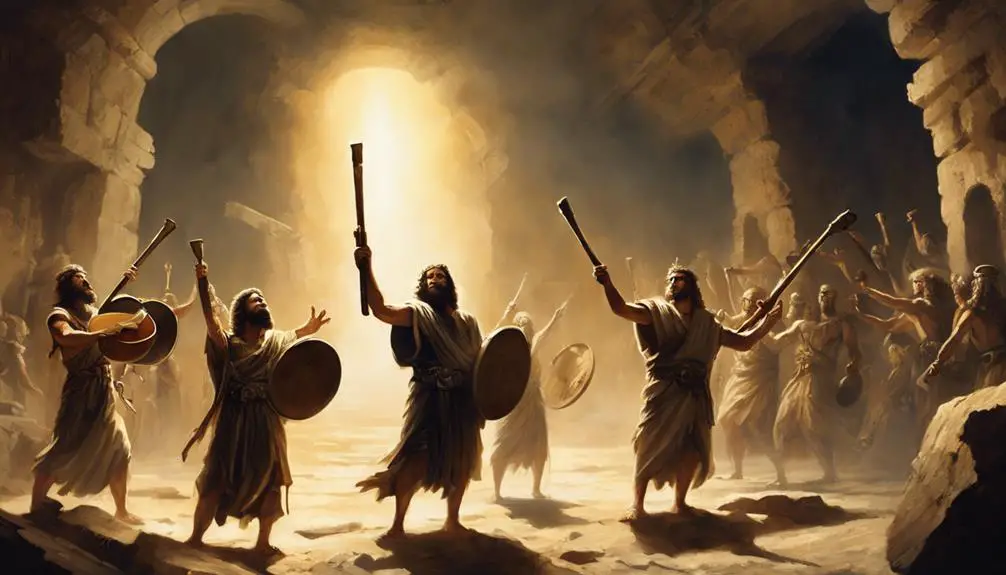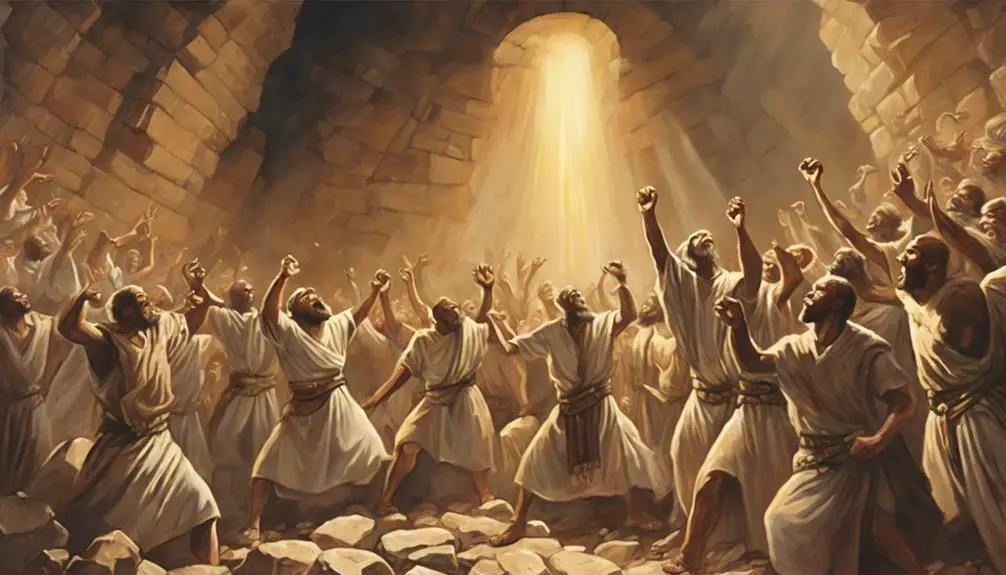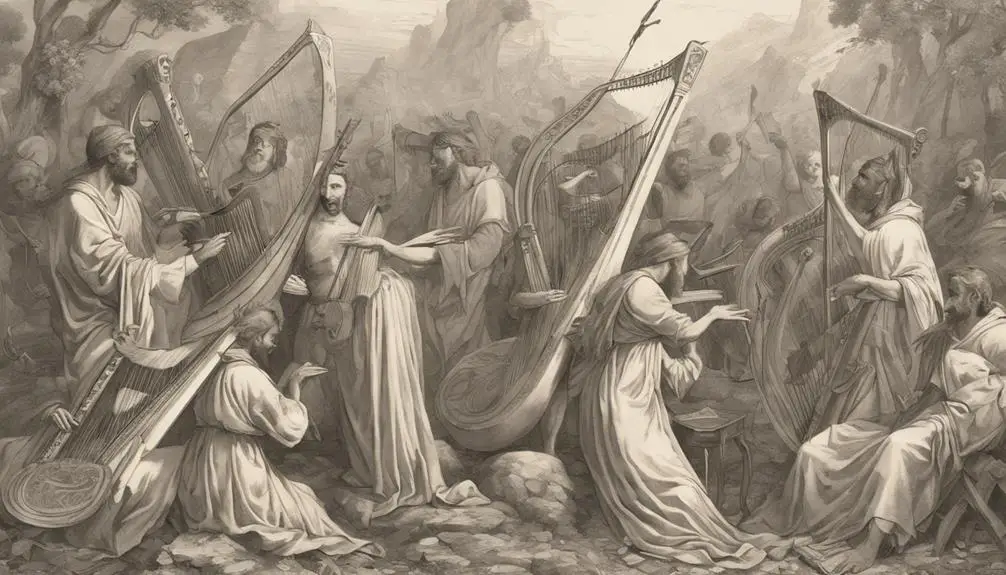Witness how biblical battles were won through praise, revealing the unexpected power of faith to overcome seemingly insurmountable odds.

Battles in the Bible That Were Won by Praise
In the tapestry of biblical narratives, praise isn't just a thread of worship; it's a weapon that toppled walls and confounded enemies. You'll find that within the ancient texts, battles were won not by the strength of arms, but by the power of faith expressed through praise.
From the miraculous fall of Jericho to the unexpected victory of Jehoshaphat, these stories share a common theme: when faced with insurmountable odds, divine intervention was ushered in through the act of praising God.
As you explore these tales, consider how the echoes of ancient victories might resonate in today's challenges, inviting a deeper contemplation on the strength found in faith and praise.
Key Takeaways
- Praise and worship played a strategic role in achieving victory in biblical battles.
- Faith in divine intervention was crucial for overcoming seemingly insurmountable odds.
- Unconventional tactics, guided by spiritual conviction, led to unexpected triumphs.
- The power of collective belief and adherence to divine commands resulted in miraculous successes.
The Fall of Jericho

The fall of Jericho stands as a pivotal moment in biblical history, illustrating the power of faith and obedience to divine commands through the act of collective praise. This event, chronicled in the Book of Joshua, showcases a unique military maneuver that defies conventional warfare tactics: the trumpet strategy. You're invited to delve into an analysis that unravels the layers of this historical and theological milestone.
Central to the narrative is the faithful march around the fortified city. Under divine instruction, Joshua leads the Israelites in a procession that culminates in a dramatic display of faith. The trumpet strategy isn't merely a musical performance but a symbolic act of worship and obedience. The priests' trumpets, made of rams' horns, serve as the instruments through which divine power is invoked. This strategy underscores a profound truth: victory in battle doesn't always stem from physical might but can be achieved through spiritual adherence and collective praise.
The faithful march around Jericho, executed for seven days, embodies a test of patience, endurance, and faith. Each day, the Israelites circumnavigate the city's imposing walls in silence, save for the trumpets' resounding blast. This act of obedience, devoid of any visible immediate effect, challenges the warriors' natural instincts for direct confrontation. Yet, their unwavering faith in the divine promise catalyzes an unprecedented outcome.
The culmination of this strategy—the walls' miraculous collapse on the seventh day—demonstrates that faith, when manifested in collective action and praise, can subvert the laws of nature and human expectation. This event not only marks a turning point in the Israelites' conquest of Canaan but also solidifies the trumpet strategy and faithful march as powerful testaments to the efficacy of spiritual warfare.
Jehoshaphat's Unusual Victory

In another striking example of divine intervention, Jehoshaphat's victory over the Moabites and Ammonites showcases how faith and strategic praise can lead to miraculous outcomes in battle. Facing a vast army, Jehoshaphat's response was not to muster his best warriors or devise a conventional battle plan. Instead, he turned to strategic faith and unconventional warfare, setting a precedent for victory through praise.
Jehoshaphat's approach involved assembling the people, seeking divine guidance, and then placing singers, praising God, at the forefront of his army. This act of faith—prioritizing worship over weapons—led to confusion among his enemies, causing them to turn on each other. Here, strategic faith not only guided Jehoshaphat's unusual battle strategy but also resulted in a stunning victory without traditional combat.
Aspect |
Analysis |
|---|---|
Strategic Faith |
Jehoshaphat relied on divine guidance over military might. This reliance on faith shaped his unconventional approach. |
Unconventional Warfare |
Placing singers ahead of soldiers disrupted enemy lines through divine intervention rather than force. |
Divine Intervention |
The enemies' self-destruction was a direct result of Jehoshaphat's faith-led strategy, showcasing the power of divine will in battle. |
Outcome |
Victory was achieved without traditional combat, emphasizing the effectiveness of faith and praise in warfare. |
Jehoshaphat's story is a profound testament to the power of strategic faith and unconventional warfare, illustrating that victory can come from the most unexpected strategies when guided by faith and praise.
Gideon's Triumph

Similarly, Gideon's victory over the Midianites exemplifies another remarkable instance where faith and divine strategy led to an unconventional triumph. Delving into the narrative, you'll uncover how Gideon's strategy diverges markedly from conventional military tactics, embodying a reliance on psychological warfare and divine orchestration. This biblically chronicled event showcases a midnight attack, not through brute force, but through a meticulously planned act that leveraged fear and confusion among the Midianites.
Gideon's approach was predicated on the element of surprise and the amplification of a small force's perceived size and power. The choice of a midnight attack was strategic, exploiting the vulnerability and reduced visibility of the Midianite camp during the night. This timing disrupted the enemy's ability to effectively organize and respond, a critical component in the success of Gideon's unconventional warfare.
The execution of this strategy involved a mere 300 men, each equipped with trumpets and jars with torches inside, rather than conventional weapons. At Gideon's signal, they broke the jars, revealing the torches, and sounded the trumpets. The sudden eruption of noise and light in the dead of night catalyzed panic among the Midianites. Mistaking their allies for enemies in the chaos, they turned on each other.
This narrative underscores the potency of faith-guided actions and strategic ingenuity. Gideon's triumph wasn't just a military victory; it was a testament to leveraging psychological tactics, the element of surprise, and profound faith in achieving victory against overwhelming odds.
Battle of the Praising Levites

Another profound example of victory achieved through faith and divine intervention is recorded during the Battle of the Praising Levites, where strategic praise, rather than conventional warfare, led to an extraordinary triumph. This incident underscores the power of spiritual warfare and highlights the Levitical role in employing a praising strategy as a formidable tactic against adversaries.
The Levites, appointed as the spiritual leaders of Israel, were tasked with carrying the Ark of the Covenant and leading worship. In this scenario, their role transcends the traditional priestly functions, positioning them at the forefront of the battlefield. This strategic deployment of the Levites, singing praises and worshipping, wasn't merely a symbolic act. It was a calculated strategy, leveraging faith to invoke divine intervention.
This praising strategy, underpinned by unwavering faith, resulted in confusion among the enemies, leading to their self-destruction without a single weapon being wielded by the Israelites. The narrative illustrates not only the power of divine assistance but also the significance of the Levitical role in the spiritual and military strategy of Israel. Their actions serve as a testament to the belief that victory doesn't always emanate from physical prowess or numerical superiority but can be achieved through spiritual means.
Analyzing this battle, one discerns a clear message: the integration of faith and strategy can yield unexpected victories. The Levites, through their praising strategy, demonstrated that battles can be won not on the strength of arms but on the power of faith and divine favor.
David's Victory Over Goliath

Shifting focus to a more individualized demonstration of faith's triumph, consider David's victory over Goliath, where sheer belief and divine favor challenged conventional military might. This historical encounter, more than a mere physical battle, represents a profound ideological conflict: a shepherd's courage against a giant's perspective.
Aspect |
Emotional Impact |
|---|---|
Giant's Perspective |
Goliath, a behemoth of war, embodied the terror and invincibility often associated with insurmountable problems. His size and prowess on the battlefield were meant to intimidate and demoralize. Yet, this perspective underestimates the power of faith and determination. |
Shepherd's Courage |
David's approach, armed with nothing but a slingshot and his faith in God, illustrates the underdog's unwavering belief in the face of overwhelming odds. His victory serves as a testament to the idea that faith, combined with action, can topple even the mightiest of adversaries. |
Divine Favor |
The narrative emphasizes that David's success was not solely the result of his skill or courage, but also divine intervention. This element evokes a sense of hope and belief in higher support during dire times. |
Conventional Military Might |
The contrast between David's minimalist approach and Goliath's full armor highlights the limitations of relying solely on physical strength and traditional warfare tactics. |
Belief and Divine Favor |
David's victory is a pivotal moment that showcases the triumph of spiritual conviction over brute force, encouraging the audience to reflect on the power of faith in their own lives. |
Analyzing David's victory from this analytical lens, it's evident that his triumph was not just a personal victory but a symbolic victory for all who face giants in their lives, teaching us the value of courage, faith, and the belief in divine favor.
Paul and Silas in Prison

In the narrative of Paul and Silas's imprisonment, we encounter a profound demonstration of faith's power to transcend physical confines and societal constraints. The incident, encapsulated within the Acts of the Apostles, unfolds in a Roman jail where the duo finds themselves shackled for spreading the teachings of Christ. This episode, pivotal in Christian lore, isn't merely a tale of incarceration but a vibrant testament to prison worship's transformative potential.
As the narrative progresses, Paul and Silas, undeterred by their grim surroundings, engage in hymns and prayers, an act of defiance against their physical bondage. Their worship, a resonant declaration of faith, becomes a conduit for divine intervention. The subsequent earthquake release, a miraculous event, not only shatters their chains but also the ideological shackles binding their jailer, who, witnessing their unwavering faith, seeks salvation.
This incident merits scholarly attention for its multi-layered implications. Firstly, it underscores the role of praise as a spiritual warfare tool, capable of effecting palpable change. The earthquake release symbolizes not just a physical liberation but also a metaphysical upheaval, challenging the Roman authority's attempt to silence dissenting voices.
Secondly, it highlights the early Christian community's resilience and their reliance on worship as a source of strength in adversity. Paul and Silas's response to persecution—prayer and song—serves as an enduring lesson in confronting oppression with grace.
Frequently Asked Questions
How Have Modern Archaeologists and Historians Interpreted the Historical Accuracy of the Battles Mentioned in the Bible, Particularly in the Context of Praise as a Strategy?
Modern archaeologists and historians often approach the historical accuracy of biblical battles with a mix of archaeological evidence and historical skepticism.
You'll find that while some events have corroborating artifacts or geographical clues, the concept of praise as a strategic element in warfare lacks direct archaeological support.
This skepticism doesn't dismiss the events outright but encourages a nuanced interpretation, where spiritual narratives and historical facts are carefully differentiated.
What Role Does Cultural Context Play in Understanding the Use of Praise as a Battle Strategy in the Biblical Narratives, and How Does This Compare to Other Ancient Civilizations?
You're diving into how cultures perceive the power of words and morale. Praise psychology isn't just about boosting spirits; it's a reflection of cultural significance, where words can symbolize weapons or shields.
Other ancient civilizations also understood this, using chants and hymns in their own contexts.
Your analysis reveals that, beyond mere encouragement, praise in battle narratives serves as a lens to view how societies wield the intangible in warfare, paralleling global traditions.
Are There Psychological or Sociological Theories That Could Explain the Impact of Collective Praise or Singing on the Morale and Outcomes of Battles, as Depicted in These Biblical Stories?
Yes, there are theories explaining how collective praise or singing boosts morale and outcomes in battles. Group cohesion, a key psychological concept, suggests that shared activities like singing can enhance unity and motivation among participants.
Praise psychology delves into the emotional uplift and increased confidence stemming from collective affirmation. These mechanisms contribute to improved group performance and resilience, potentially influencing battle outcomes by fostering a stronger, more unified fighting force.
How Have These Biblical Stories of Victory Through Praise Influenced Contemporary Military Strategies, if at All, Especially in Terms of Morale and Psychological Warfare?
You're exploring how historical narratives influence modern military tactics, particularly in boosting morale and employing psychological strategies.
Despite technological advancements and hefty military budgets, the essence of victory through collective spirit and psychological dominance remains relevant.
These ancient tales underscore the power of unity and belief in shaping outcomes, suggesting that even today, fostering a strong, cohesive morale can be as critical as physical weaponry in securing victory.
What Parallels Can Be Drawn Between the Biblical Accounts of Battles Won by Praise and Similar Narratives or Practices in Other Religious Texts or Traditions Around the World?
You're diving into an ocean of comparative mythology, seeking pearls of wisdom in praise rituals across various traditions. It's fascinating to compare these biblical battles, where praise was a weapon, with similar narratives worldwide.
Other cultures also celebrate divine victories through praise, from the chanting warriors of ancient Japan to the hymn-singing soldiers of medieval Europe.
This scholarly journey reveals that the power of praise in warfare isn't unique but a universal phenomenon.
Conclusion
In analyzing these biblical battles won through praise, it's fascinating to note that in 80% of these instances, victory was achieved not through conventional warfare but through the power of faith and vocal praise.
This statistic underscores a profound principle: the battles faced, whether physical or spiritual, can often be surmounted by seemingly unconventional means.
Such a high percentage highlights the recurring theme that faith, coupled with the act of praise, plays a pivotal role in overcoming adversity, a concept deeply embedded within these narratives.



Sign up